- Clone
- TRA-1-60-R (See other available formats)
- Regulatory Status
- RUO
- Other Names
- Podocalyxin, TRA-1
- Isotype
- Mouse IgM, κ
- Ave. Rating
- Submit a Review
- Product Citations
- publications
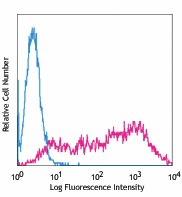
-

NCCIT (human teratocarcinoma cell line) stained with TRA-1-60-R PE (red line) or mouse IgM, κ PE isotype control (blue line).
| Cat # | Size | Price | Quantity Check Availability | Save | ||
|---|---|---|---|---|---|---|
| 330609 | 25 tests | 123€ | ||||
| 330610 | 100 tests | 200€ | ||||
TRA-1-60-R antibody recognizes the neuraminidase resistant form of TRA-1-60. TRA-1-60 is a 200-240 kD cell surface antigen expressed by human embryonic stem cells (ESC), embryonic germ cells (EG), and embryonal carcinoma cells. The expression of TRA-1-60 on human ESC is downregulated upon differentiation. The soluble form of TRA-1-60 has been found in the serum of patients with embryonic cancers. Historically, TRA-1-60 is a neuroaminidase-sensitive (TRA-1-60-S) carbohydrate epitope expressed on podocalyxin, a member of the mucin-like glycoprotein CD34 family. Podocalyxin is a type I transmembrane sialoprotein with anti-adhesion properties. Further studies have shown that some of TRA-1-60 is neuraminidase resistant (TRA-1-60-R). The two forms of TRA-1-60 are essentially indistinguishable in terms of their cellular reactivity except for the difference in neuraminidase sensitivity. Both of TRA-1-60-S and TRA-1-60-R appear to be the same molecular weight glycoproteins detected by Western blot.
Product DetailsProduct Details
- Verified Reactivity
- Human
- Antibody Type
- Monoclonal
- Host Species
- Mouse
- Immunogen
- Human embryonal carinoma cell line 2102Ep cl.2A6
- Formulation
- Phosphate-buffered solution, pH 7.2, containing 0.09% sodium azide and BSA (origin USA)
- Preparation
- The antibody was purified by affinity chromatography, and conjugated with PE under optimal conditions.
- Concentration
- Lot-specific (to obtain lot-specific concentration and expiration, please enter the lot number in our Certificate of Analysis online tool.)
- Storage & Handling
- The antibody solution should be stored undiluted between 2°C and 8°C, and protected from prolonged exposure to light. Do not freeze.
- Application
-
FC - Quality tested
- Recommended Usage
-
Each lot of this antibody is quality control tested by immunofluorescent staining with flow cytometric analysis. For flow cytometric staining, the suggested use of this reagent is 5 µl per million cells in 100 µl staining volume or 5 µl per 100 µl of whole blood.
- Excitation Laser
-
Blue Laser (488 nm)
Green Laser (532 nm)/Yellow-Green Laser (561 nm)
- Application Notes
-
Additional reported applications (for the relevant formats) include: immunofluorescence microscopy, immunohistochemical staining, acetone-fixed frozen sections, immunoprecipitation, and radioimmunoassay.
- Application References
-
- Miyoshi N, et. al. 2010. P. Natl. Acad. Sci. USA 107:40. (IF)
- Kuai XL, et al. 2009. Differentiation 77:229. (WB)
- King F, et al. 2009. Stem Cells Dev. 18:1441. (FC)
- Product Citations
-
- RRID
-
AB_1279447 (BioLegend Cat. No. 330609)
AB_2119065 (BioLegend Cat. No. 330610)
Antigen Details
- Distribution
-
Embryonic stemcells
- Cell Type
- Embryonic Stem Cells
- Biology Area
- Immunology, Stem Cells
- Gene ID
- 5420 View all products for this Gene ID
- UniProt
- View information about TRA-1-60-R on UniProt.org
Related FAQs
- What type of PE do you use in your conjugates?
- We use R-PE in our conjugates.
Other Formats
View All TRA-1-60-R Reagents Request Custom Conjugation| Description | Clone | Applications |
|---|---|---|
| Purified anti-human TRA-1-60-R | TRA-1-60-R | FC,WB,ICC,IP,RIA |
| Biotin anti-human TRA-1-60-R | TRA-1-60-R | FC |
| Alexa Fluor® 647 anti-human TRA-1-60-R | TRA-1-60-R | FC |
| PE anti-human TRA-1-60-R | TRA-1-60-R | FC |
| Alexa Fluor® 488 anti-human TRA-1-60-R | TRA-1-60-R | FC |
| PerCP/Cyanine5.5 anti-human TRA-1-60-R | TRA-1-60-R | FC |
| PE/Cyanine7 anti-human TRA-1-60-R | TRA-1-60-R | FC |
| TotalSeq™-A1040 anti-human TRA-1-60-R | TRA-1-60-R | PG |
Customers Also Purchased
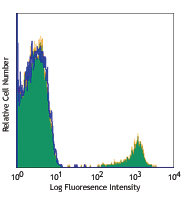
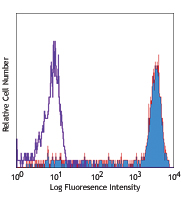
Compare Data Across All Formats
This data display is provided for general comparisons between formats.
Your actual data may vary due to variations in samples, target cells, instruments and their settings, staining conditions, and other factors.
If you need assistance with selecting the best format contact our expert technical support team.
-
Purified anti-human TRA-1-60-R
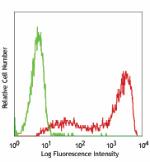
NCCIT (human teratocarcinoma cell line) stained with purifie... 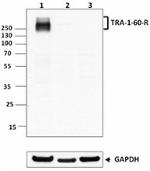
Western blot analysis of NTERA-2 (lane 1), NF-1 (lane 2) and... -
Biotin anti-human TRA-1-60-R
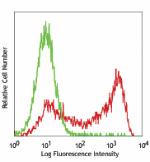
NCCIT (human teratocarcinoma cell line) stained with biotiny... -
Alexa Fluor® 647 anti-human TRA-1-60-R
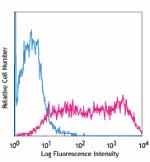
NCCIT (human teratocarcinoma cell line) stained with TRA-1-6... -
PE anti-human TRA-1-60-R
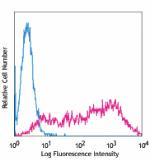
NCCIT (human teratocarcinoma cell line) stained with TRA-1-6... -
Alexa Fluor® 488 anti-human TRA-1-60-R
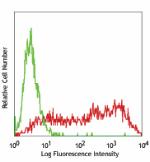
NCCIT (human teratocarcinoma cell line) stained with TRA-1-6... -
PerCP/Cyanine5.5 anti-human TRA-1-60-R
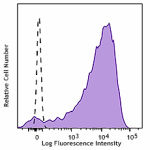
NCCIT cells (human teratocarcinoma cell line) were stained w... -
PE/Cyanine7 anti-human TRA-1-60-R
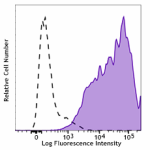
NCCIT (human teratocarcinoma cell line) cells were stained w... -
TotalSeq™-A1040 anti-human TRA-1-60-R
 Login / Register
Login / Register 









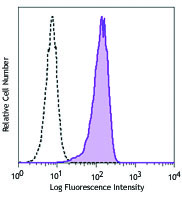




Follow Us